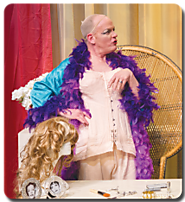-
About
- About Listly
- Community & Support
- Howto
- Chrome Extension
- Bookmarklet
- WordPress Plugin
- Listly Premium
- Privacy
- Terms
- DMCA Copyright
- © 2010-2024 Boomy Labs

 Michael Britt
Michael Britt
Listly by Michael Britt

A small number of men cross dress and many movies and broadway shows feature cross dressers (transvestites), so obviously many people find it fascinating and

What’s the connection between life on Mars and the need to properly replicate scientific studies? Well, replicating a study one time and not finding the results the original researchers find is NOT proof that the original study was a fraud. Let’s be clear about what replication really means. Here’s a bunch of examples. This topic ties into the so-called “woman on mars” that so many people are seeing. I would love it if we had solid proof that there was life on Mars. So far we have “pretty darn good” evidence that the conditions were right for life on Mars.

How can technology be used to help people with Dementia and Alzheimer’s? Here are a few examples. You may have heard of the “Internet of Things” – this is the idea that we can place small Internet-connected devices onto everyday household objects in order to get information from them about what you are doing – and not doing – throughout the day.

I was recently cast as “Albin” in the musical La Cage Aux Folles and it has given me the unique opportunity to have to learn how to act more effeminate and to cross dress. As a psychologist who obsesses about the “psychology of everyday life” you can imagine how I’ve been thinking about what there is to learn from this experience. The show goes up in less than a week but I wanted to share my experiences thus far and talk about issues such as gender roles and why I think the movie (La Cage Aux Folles or the American version which is called “The Birdcage“) and the musical have been so popular.

If you have been in therapy you want to believe it “worked”. We all do. And hopefully it did have a positive effect on you. But how do you know? How do therapists know if what they’re doing really has resulted in improvements in their clients? Yes, we have controlled studies for many treatments which give us confidence that these techniques really do help people, but we also have a lot of “therapeutic” techniques that have not been thoroughly tested. Nonetheless, lots of amazing claims are made for their effectiveness and no doubt the people who provide these therapies really do believe that they work.

We all want to help others – especially those in the “helping professions” – but what’s the best way to do that? Therapy? Medication? How about setting up an entire fake village set up to look like the ’50s with helping professionals dressed up to look like grocers? Sound bizarre? Well, they’re doing it in Amsterdam.

Does it matter if a robot looks male or female? You might not think so, but are we perpetuating stereotypes if if we create a robot that looks “feminine” to help the elderly aren’t we continuing the stereotype that these types of jobs are “women’s” jobs? If we create “masculine” looking robots to work outside and do adventurous, heavy lifting jobs aren’t we discouraging young women from entering such jobs? Something to think about. Also, have you ever said (like I have) “Like a girl“? What effect does that have on young girls? Isn’t it, upon reflection, a derogatory thing to say – implying that girls are weak and uncoordinated? And how about “Be a man” – doesn’t that encourage young boys to distance themselves from their feelings?

Here's an analysis of the movie Analyze This - what it gets wrong and right about how psychotherapy actually works.

Why does conflict emerge as it did in Baltimore last week among the police and the African-American community? Is it caused by poor parenting? Poverty? Joblessness? I provide a psychological perspective on the situation. I look at how stereotypes develop and conflict among groups develops. The solution is complex but the theories on these two issues give us some insight into what has to happen to resolve the problems.

Psychology teacher and host of the web's most popular academic psychology podcast, The Psych Files (http://www.ThePsychFiles.com). Loves teaching, tech, my family and my 3 cats.